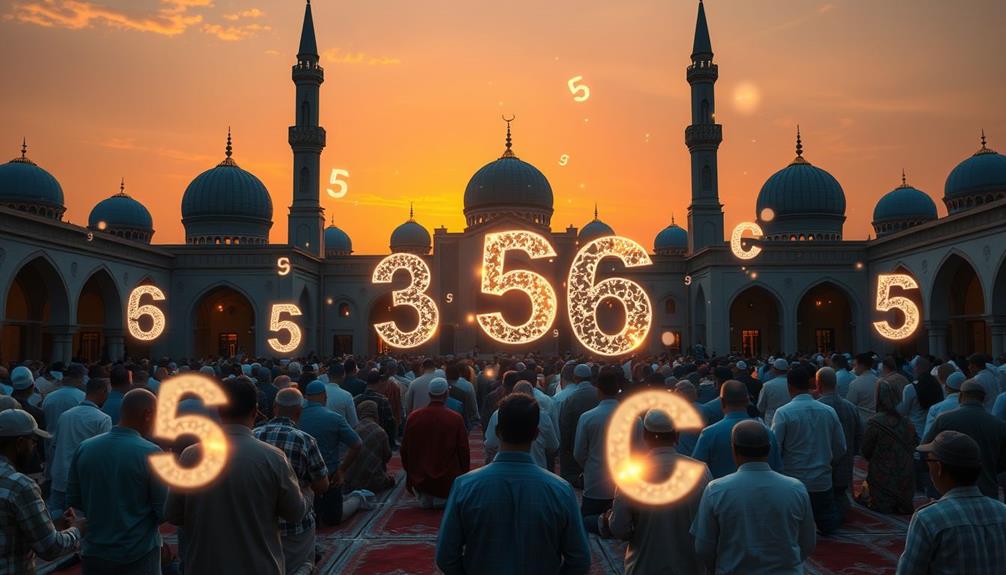Islam doesn't believe in angel numbers, which many see as spiritual signals from higher powers. The Quran and Hadith don't mention these numbers, and engaging with them could lead to shirk, the risk of associating partners with Allah. Instead, you're encouraged to focus on authentic worship and direct guidance from Allah through prayer and Quranic recitation. Islamic scholars express skepticism about numerology, highlighting that true spiritual growth comes from adhering to Islamic teachings rather than seeking meaning in numbers. Curious about how this perspective shapes spiritual practices? There's plenty more to explore on this topic!
Key Takeaways
- Islam does not recognize angel numbers, as they lack authentic references in the Quran and Hadith.
- Engaging with angel numbers may lead to shirk, diverting focus from true worship of Allah.
- Certain numbers hold significance in Islam, but attributing specific meanings can cause misunderstandings and spiritual deviation.
- Authentic spiritual growth comes from prayer, Quranic recitation, and adherence to Islamic teachings rather than numerological interpretations.
- The Islamic community generally expresses skepticism towards angel numbers, emphasizing strengthening one's relationship with Allah through genuine practices.
Definition of Angel Numbers

Angel numbers are specific sequences of numbers that many believe convey spiritual messages or guidance from higher powers, like angels or the universe. These numbers, such as 111 or 222, are thought to carry unique meanings. For instance, 111 often symbolizes new beginnings, while 333 signifies divine support.
Believers often spot these angel numbers in their daily lives—on clocks, license plates, or receipts—and interpret their recurrence as a form of divine communication.
The concept of angel numbers exists within various spiritual practices, but it's essential to highlight that it isn't rooted in Islamic teachings or scripture. Different cultures and belief systems may offer their own interpretations of these numbers, viewing them as signs of spiritual awakening or guidance.
However, skepticism surrounds the validity and origin of angel numbers, with many questioning their significance in a broader spiritual context.
While believers may find comfort and direction from these sequences, others remain doubtful, viewing them as mere coincidences. Regardless, the fascination with angel numbers continues to grow, drawing more individuals into the domain of spiritual messages and interpretations.
Islamic Perspective on Numerology

In Islam, the approach to numerology is one of caution and skepticism, as it often lacks a solid foundation in authentic teachings. The Quran and Hadith don't mention angel numbers or numerology, emphasizing the importance of relying on prayer and supplication for guidance. While certain numbers like seven hold significance in Islamic teachings, attributing specific meanings to others can lead to misunderstandings.
| Concept | Islamic Perspective | Potential Risks |
|---|---|---|
| Numerology | Viewed with skepticism; lacks authentic foundation | Can detract from spiritual growth |
| Angel Numbers | Not mentioned in Quran or Hadith | May imply reliance on creation |
| Spiritual Growth | Focus on reliance on Creator through prayer | Risks leading to shirk |
Engaging in numerology can lead to concerns of shirk, as it may imply reliance on creation rather than the Creator. Islamic scholars caution that focusing on numerological interpretations could divert believers from authentic spiritual growth and connecting with Allah. Instead, they encourage seeking guidance through prayer, which fosters a deeper connection with the Divine.
Shirk and Angel Numbers

Engaging with angel numbers can lead you down a dangerous path of shirk, the grave sin of associating partners with Allah. When you attribute significance to these numbers, you might unintentionally shift your reliance from Allah to creation for guidance. This contradicts core tenets of Islam.
- Islamic teachings emphasize that knowledge of the unseen belongs to Allah alone.
- Believing in angel numbers can divert your focus from authentic worship.
- Pursuing meanings behind these numbers risks spiritual deviation.
By relying on angel numbers, you're potentially undermining your relationship with Allah. Instead of seeking guidance through these numerical sequences, it's essential to depend solely on Allah for direction and support.
Engaging in practices related to angel numbers may lead to a misunderstanding of what true faith entails. Shirk threatens to dilute your belief, jeopardizing your spiritual well-being.
Ultimately, understanding shirk and its implications is significant for a strong faith. You should endeavor to keep your worship pure and directed solely towards Allah, as this is the essence of Islamic belief.
Avoid distractions that may take you away from the authentic worship you're meant to practice.
Importance of Direct Guidance

In Islam, you're encouraged to rely solely on Allah for guidance instead of looking for signs in angel numbers.
The Quran emphasizes that true knowledge and direction come from your direct connection with the Creator.
Reliance on Allah Alone
Reliance on Allah alone for guidance is essential for every believer seeking a meaningful life. In Islam, you're encouraged to turn to prayer and the teachings of the Quran, rather than external signs or superstitious practices. This direct connection with Allah facilitates spiritual growth and reinforces your faith.
- The Quran reminds you that knowledge of the unseen belongs to Allah alone (27:65).
- Relying on numerological interpretations can lead to shirk, distracting you from sincere worship.
- Authentic practices, like good deeds and Quranic recitation, strengthen your bond with Allah.
Quranic Guidance Emphasis
Guidance from the Quran serves as a cornerstone for every Muslim's spiritual journey, highlighting the importance of seeking direction directly from Allah.
In Islamic teachings, the knowledge of the unseen is solely Allah's domain, as stated in Surah An-Naml (27:65). This emphasizes that you should turn to the Quran, prayer, and supplication for guidance instead of relying on intermediaries like angel numbers.
Engaging with practices that elevate numbers to a status of power risks leading you into shirk, the grave sin of associating partners with Allah.
The Prophet Muhammad warned against seeking knowledge of the unseen through illegitimate means, stressing that true spiritual growth comes from strengthening your connection with Allah and adhering to authentic Islamic practices.
Spiritual Implications for Believers

Many believers may find themselves drawn to the concept of angel numbers as a source of spiritual insight. However, from an Islamic perspective, engaging with these numerological interpretations can divert your focus from authentic practices and your reliance on Allah.
Instead of fostering spiritual growth, this fascination may lead you toward superstitions that compromise your faith.
- Relying on angel numbers might distract you from good deeds and prayer.
- The Quran teaches that knowledge of the unseen belongs solely to Allah.
- Interpreting angel numbers could lead to potential shirk, undermining the integrity of your belief.
While seeking spiritual significance is natural, it's important to remember that true connection and growth in Islam come through the teachings of the Quran, prayer, and good deeds.
Pursuing angel numbers can become a harmful distraction, pulling you away from the genuine essence of your faith. Instead, focus on strengthening your relationship with Allah through authentic practices, ensuring that your spiritual journey remains aligned with Islamic teachings.
Common Angel Numbers Explained

Often, people encounter various angel numbers that carry specific meanings and interpretations. These common angel numbers can serve as messages from spiritual guides, offering insights into your life and its spiritual significance.
| Angel Number | Meaning |
|---|---|
| 111 | New beginnings |
| 222 | Balance and harmony |
| 333 | Divine support and encouragement |
| 444 | Protection and reassurance |
| 555 | Positive life changes and transformation |
From an Islamic perspective, these numbers reflect divine blessings and guidance. For instance, seeing 111 often encourages you to embrace new beginnings, while 222 reminds you to maintain balance in your life. The number 333 signifies that you have spiritual guides supporting you through challenges.
When you encounter 444, it's a reassurance that you're on the right path, protected in your journey. Finally, 555 encourages you to accept transformation and growth, paving the way for positive life changes. Recognizing these numbers can enhance your spiritual journey, inviting you to explore the depths of your faith and connection to the divine.
Distinction Between Angels and Numbers

Understanding the difference between angels and numbers is important for those exploring spirituality within an Islamic framework. In Islam, angels are divine beings created by Allah to fulfill specific purposes, such as delivering messages and executing His commands. They lack free will and are integral to Islamic teachings.
On the other hand, angel numbers are sequences believed by some to have spiritual significance, but this idea isn't supported by the Quran.
- Angels are part of the unseen world, acting solely on Allah's instructions.
- Angel numbers suggest meanings that can lead to confusion and potential shirk.
- Relying on numerical interpretations diverts focus from worshiping Allah.
Islam emphasizes that the knowledge of the unseen, including any meaning behind numbers, belongs solely to Allah. Engaging with angel numbers can lead to superstition, which is discouraged in Islamic doctrine.
It's crucial to focus on the established understanding of angels rather than attributing specific meanings to numbers. This approach helps maintain a clear connection to worshiping Allah without unnecessary intermediaries that could distract from the core tenets of faith.
Superstitions and Islamic Teachings

Superstitions, including beliefs in angel numbers, directly challenge Islamic teachings and can lead you away from true faith. In Islam, relying on such superstitions can lead to shirk, as it attributes divine significance to created entities rather than placing your trust in Allah.
The Quran emphasizes that knowledge of the unseen belongs solely to Allah (27:65), making it clear that seeking guidance from numbers is inappropriate.
Engaging with angel numbers can distract you from the core teachings of Islam, which focus on direct communication with Allah through prayer and the Quran. Superstitions can't only lead to spiritual harm but also deviate you from authentic faith.
The historical context of Jahiliyyah shows that these beliefs were prevalent before the advent of Islam, and the religion aims to eradicate such practices for a purer faith.
Spiritual Growth Through Authentic Practices

Fostering spiritual growth in Islam revolves around engaging in authentic practices that deepen your connection with Allah. By focusing on these core activities, you can enhance your spiritual development and strengthen your relationship with Him:
- Regular prayer (Salah) to establish a consistent dialogue with Allah
- Quranic recitation to gain wisdom and understanding from His words
- Following the Sunnah of the Prophet Muhammad as a model for righteous living
Engaging in these authentic practices allows you to grow spiritually and align yourself with Islamic teachings.
Seeking knowledge (Ilm) is also essential; it's encouraged to pursue understanding that enriches your faith and avoids pseudoscience or superstitions. This commitment to learning helps you cultivate a deeper understanding of your beliefs.
Additionally, community involvement and acts of charity not only fulfill communal responsibilities but also enhance your spiritual growth.
These actions reflect the essence of Islamic values and reinforce your reliance on Allah rather than on external signs or numbers.
Community Perspectives on Angel Numbers

Engaging in authentic practices is essential for spiritual growth, but discussions about angel numbers often arise within the community, highlighting differing perspectives. Many Muslims view the belief in angel numbers with skepticism, as it can lead to superstitious practices that distract from reliance on Allah. Islamic scholars warn that attributing specific meanings to numbers could verge on shirk, suggesting dependence on created signs instead of the Creator.
Here's a table summarizing community perspectives:
| Perspective | Viewpoint | Key Concern |
|---|---|---|
| Islamic Scholars | Focus on Quranic teachings, not numerology | Avoiding shirk |
| General Community | Some find comfort in angel numbers | Potential for superstitions |
| Faith Emphasis | Strengthening relationship with Allah | Authentic practices needed |
| Historical Context | Avoiding Jahiliyyah practices | True spiritual growth |
While some individuals may seek guidance from angel numbers, the predominant view encourages a strong relationship with Allah through established practices, ensuring that faith remains grounded in authentic Islamic teachings.
Frequently Asked Questions
Can Muslims Believe in Angel Numbers?
You can notice angel numbers, but it's crucial to focus on your faith and connection with Allah. Relying on numerology might distract you from seeking guidance through prayer, the Quran, and personal reflection.
Do Numbers Have a Significance in Islam?
In Islam, numbers hold significance in rituals, like the rakahs in prayers, yet they're not viewed as omens. You'll find focus on faith and divine guidance rather than superstitions based on numerical interpretations.
What Does Islam Say About Numerology?
Islam cautions against numerology, as it can foster superstitious beliefs and distract you from authentic spiritual growth. Instead, focus on seeking guidance through prayer and the teachings of the Quran for true understanding.
What Does 777 Mean in Islam?
When you see 777 during a moment of reflection, it could symbolize divine blessing in Islam. This number echoes the seven heavens, inviting you to align your life with Allah's guidance and purpose.
Conclusion
In the tapestry of faith, angel numbers weave a thread that some may find tempting, yet Islam anchors you in direct guidance from Allah. While the stars may whisper, true enlightenment blooms through authentic practices and unwavering belief. Embrace the light of knowledge over superstition, for spiritual growth flourishes in the soil of understanding. Remember, it's not the numbers that guide you, but the divine wisdom that pulses through your heart, lighting your path in this vast universe.









